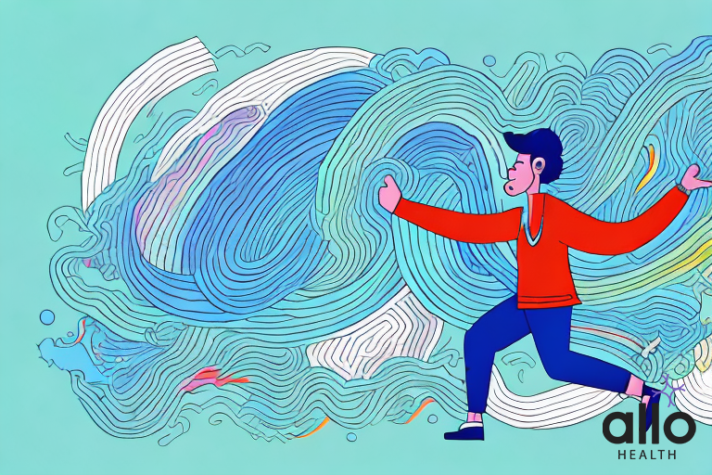How to Keep Going After Ejaculation: Tips and Strategies

Allo Health is dedicated to personalized well-being, offering support and trusted information tailored to individual health goals. The platform emphasizes human-generated content, led by a distinguished medical team of experts, including physicians and sexual health specialists. Their commitment to credibility involves rigorous fact-checking, authoritative research, and continuous updates to ensure accurate, up-to-date information. Allo Health's unique approach goes beyond conventional platforms, providing expert-led insights and a continuous commitment to excellence, with user feedback playing a crucial role in shaping the platform's authoritative voice.

Dr. Aditi completed her undergraduate medical education at AJIMS, Mangalore, after which she worked in multi-speciality hospitals with COVID patients and in the Pain and Palliative medicine department. Driven by her experiences, she developed a keen interest in psychiatry. Dr. Aditi believes that mental health is just as, if not more important, than physical health.
Why This Was Upated?
Our experts continually monitor the health and wellness space, and we update our articles when new information became available.
Updated on 22 June, 2024
- Article was updated as part of our commitment to diversity, equity, and inclusion.

"The following blog article provides general information and insights on various topics. However, it is important to note that the information presented is not intended as professional advice in any specific field or area. The content of this blog is for general educational and informational purposes only.
Book consultation
The content should not be interpreted as endorsement, recommendation, or guarantee of any product, service, or information mentioned. Readers are solely responsible for the decisions and actions they take based on the information provided in this blog. It is essential to exercise individual judgment, critical thinking, and personal responsibility when applying or implementing any information or suggestions discussed in the blog."
Maintaining sexual stamina can be challenging, particularly for men who struggle with premature ejaculation. However, there are various techniques and strategies you can employ to prolong your sexual encounters and enhance your overall sexual performance. In this article, we’ll explore some of the most effective ways to keep going after ejaculation, as well as the psychological and physical factors that impact male sexual response.
Understanding Male Sexual Response
The male sexual response is a complex physiological and psychological process that involves various stages. These stages are often described using the model known as the sexual response cycle, first proposed by Masters and Johnson in the 1960s. The cycle consists of four phases: excitement, plateau, orgasm, and resolution. However, it’s important to note that individual experiences can vary, and not everyone follows this sequence precisely.
- Excitement Phase:
- Physical Changes: During this phase, a man typically experiences sexual arousal in response to sexual stimuli, whether visual, auditory, or tactile. This leads to physiological changes such as increased blood flow to the genital area, resulting in penile erection.
- Psychological Changes: The brain plays a crucial role in sexual response. Emotional and mental arousal triggers the release of neurotransmitters, such as dopamine and serotonin, contributing to feelings of pleasure and anticipation.
- Plateau Phase:
- Sustained Arousal: This phase involves a continuation of the changes that began in the excitement phase. The penis remains erect, and there is a further increase in heart rate and muscle tension.
- Preparation for Orgasm: The body continues to prepare for orgasm during this phase.
- Orgasm Phase:
- Ejaculation: The orgasm phase is marked by the release of semen from the penis. It is accompanied by intense physical and emotional sensations.
- Muscle Contractions: Muscles in the genital and pelvic area contract rhythmically, and there is a release of sexual tension built up during the previous phases.
- Resolution Phase:
- Return to Baseline: After orgasm, the body gradually returns to its pre-aroused state. This involves a decrease in heart rate, relaxation of muscles, and a refractory period during which a man may not be responsive to further sexual stimulation.
- Refractory Period: Some men experience a refractory period during which they are unable to achieve another erection or orgasm. The duration of this period varies among individuals and tends to increase with age.
It’s important to recognize that the male sexual response is influenced by both physical and psychological factors. Hormones, such as testosterone, play a role in sexual function, but emotional and mental well-being, relationship dynamics, and overall health also contribute to sexual experiences.
Additionally, individual variations are common, and not everyone will follow the same pattern or experience the same intensity of response. Factors like stress, fatigue, medications, and underlying health conditions can also impact sexual function. If someone has concerns about their sexual health, it is advisable to consult with a healthcare professional or a qualified sex therapist for personalized guidance and support.

Ejaculation and The Refractory Period
Ejaculation and the refractory period are integral components of the male sexual response, and they play crucial roles in the overall sexual experience. Let’s explore each in detail:
Ejaculation:
Process:
- Ejaculation is the release of semen from the penis, typically accompanied by intense physical and emotional sensations. It is the climax of the sexual response cycle.
- The process of ejaculation is triggered by a series of contractions of the pelvic muscles, particularly the muscles surrounding the base of the penis (bulbospongiosus and ischiocavernosus muscles), leading to the expulsion of semen.
Orgasm:
- Ejaculation and orgasm are often used interchangeably, but they are distinct events. Orgasm is the subjective experience of intense pleasure and release associated with sexual climax.
- While ejaculation is a physiological process, orgasm involves a combination of physical and psychological sensations, including the release of neurotransmitters like dopamine.
Refractory Period:
- Definition:
- The refractory period is a temporary phase following ejaculation during which a man is unable to achieve another erection and orgasm.
- It is a natural and common aspect of male sexual physiology, and its duration varies among individuals.
- Duration:
- The length of the refractory period is influenced by several factors, including age, individual differences, and overall health.
- In general, younger men often have shorter refractory periods, while older men may experience longer ones. However, there is significant variability, and individual experiences can differ.
- Physiological Changes:
- During the refractory period, there is a decrease in sexual arousal and a return to a non-aroused state.
- Physiologically, this period is associated with a reduction in the levels of neurotransmitters like dopamine and an increase in the release of prolactin, a hormone that contributes to the sense of sexual satiety.
- Factors Influencing the Refractory Period:
- Age: Younger men generally experience shorter refractory periods.
- Health: Physical and mental health can impact the duration of the refractory period.
- Individual Differences: There is considerable variability among individuals, and factors like stress, fatigue, and relationship dynamics can influence the refractory period.
- Multiple Orgasms: Some men, particularly those who practice techniques such as certain forms of Tantric sex or Karezza, may be able to experience multiple orgasms without a refractory period. However, this is not common for most men.
Understanding the dynamics of ejaculation and the refractory period is essential for both individual and relational sexual health. If someone has concerns about these aspects of their sexual function, seeking guidance from a healthcare professional or a qualified sex therapist can provide valuable insights and support.
Factors That Affect Sexual Stamina
Sexual stamina refers to the ability to sustain sexual activity for a prolonged period without premature ejaculation or fatigue. Various physical, psychological, and lifestyle factors can influence sexual stamina. Here are some factors in detail:
Physical Factors:
- Cardiovascular Health: Efficient blood circulation is crucial for sexual function. Cardiovascular conditions, such as high blood pressure or poor cardiovascular health, can affect stamina.
- Hormonal Balance: Hormones, particularly testosterone, play a significant role in sexual function. Imbalances can affect libido and overall sexual performance.
- Neurological Health: The nervous system controls sexual response. Disorders or injuries affecting the nerves can impact the ability to maintain sexual stamina.
- Pelvic Floor Muscles: Weak pelvic floor muscles may contribute to premature ejaculation. Strengthening these muscles through exercises like Kegels can improve stamina.
- Medications: Some medications may have sexual side effects, affecting stamina. Consult with a healthcare professional if you suspect medication is impacting your sexual performance.
Psychological Factors:
- Stress and Anxiety: Mental health is closely linked to sexual stamina. Stress and anxiety can lead to performance anxiety and premature ejaculation.
- Depression: Depression can affect libido and overall interest in sexual activity, impacting stamina.
- Performance Anxiety: Worrying about sexual performance can contribute to premature ejaculation or difficulty maintaining an erection.
- Body Image Concerns: Negative body image can lead to self-consciousness during sexual activity, affecting stamina.
- Relationship Dynamics: Relationship concerns or lack of emotional intimacy can impact sexual stamina. Open communication is crucial to addressing these concerns.
Lifestyle Factors:
- Physical Fitness: Regular exercise promotes cardiovascular health and overall well-being, positively influencing sexual stamina.
- Diet and Nutrition: A healthy diet contributes to general health, including sexual health. Nutrient-rich foods support optimal sexual function.
- Sleep Quality: Lack of sleep can lead to fatigue and impact sexual stamina. Aim for sufficient, quality sleep each night.
- Substance Use: Excessive alcohol consumption and recreational drug use can negatively impact sexual performance and stamina.
- Smoking: Smoking is associated with cardiovascular concerns, which can affect sexual stamina. Quitting smoking can have positive effects.
- Hydration: Dehydration can lead to fatigue, affecting overall stamina. Maintaining proper hydration is essential.
Techniques and Behavioral Factors:
- Masturbation Habits: Certain masturbation habits, such as frequent or rapid stimulation, may contribute to premature ejaculation during partnered sex.
- Pelvic Floor Exercises (Kegels): Strengthening pelvic floor muscles through exercises like Kegels can enhance control and stamina.
- Controlled Breathing: Deep, controlled breathing can help manage anxiety and prolong sexual activity.
- Edging: Edging involves intentionally delaying orgasm during sexual activity to improve control and stamina.
Individuals experiencing concerns about sexual stamina should consider discussing these concerns with a healthcare professional or a qualified sex therapist. They can provide personalized advice and strategies to address specific factors influencing sexual performance.
How to Keep Going After Ejaculation: Tips and Strategies

The ability to continue sexual activity after ejaculation is often referred to as multiple orgasms or non-ejaculatory orgasms. While it’s more common for individuals with penises to experience a refractory period after ejaculation, some may explore ways to extend sexual pleasure. Here are some tips and strategies in detail:
Mindfulness and Control:
- Edging Technique: Edging involves intentionally delaying orgasm during sexual activity. This can be achieved by slowing down or temporarily stopping stimulation when nearing climax.
- Mindful Breathing: Deep and controlled breathing can help maintain focus and control over arousal levels.
Pelvic Floor Exercises (Kegels):
- Strengthening the pelvic floor muscles through Kegel exercises can improve overall sexual function and control. These exercises involve contracting and relaxing the muscles used to control urination.
Learning Ejaculatory Control:
- Start-Stop Technique: This technique involves stopping sexual activity just before reaching the point of no return and then resuming after reducing arousal.
Masturbation Techniques:
- Non-Ejaculatory Masturbation: Practicing non-ejaculatory masturbation can help individuals become more aware of their arousal levels and gain better control.
Mind-Body Connection:
- Focus and Visualization: Concentrate on the sensations and experiences in the moment. Visualization of pleasurable scenarios can enhance the mind-body connection.
Communication with a Partner:
- Open Communication: Discussing desires and boundaries with a partner is crucial. Understanding each other’s needs can lead to a more satisfying sexual experience.
Healthy Lifestyle Choices:
- Diet and Exercise: Maintaining a healthy lifestyle contributes to overall sexual health. Regular exercise and a balanced diet support cardiovascular function.
- Avoiding Substance Abuse: Limiting alcohol and avoiding recreational drugs can positively impact sexual performance.
Experimentation and Exploration:
- Experiment with Sensation Play: Exploring different forms of stimulation, such as light touch or temperature play, can enhance sexual experiences.
Seek Professional Guidance:
- Sex Therapist or Educator: Consulting with a sex therapist or educator can provide personalized guidance on techniques and practices that may work for an individual or couple.
It’s important to note that not everyone can achieve multiple orgasms, and attempting to do so should be a personal choice. Additionally, individual experiences vary, and what works for one person may not work for another. Communication and mutual consent are key elements in exploring new techniques and strategies with a partner. If someone has concerns or questions about their sexual health, seeking guidance from a healthcare professional or a qualified sex therapist is recommended.
Most Asked Questions
-
Can men experience a couple of orgasms?
Yes, a few guys can enjoy more than one orgasms. This capacity is frequently related to the idea of non-ejaculatory or multiple orgasms, wherein a person can maintain sexual activity after the preliminary climax without ejaculating. Achieving more than one orgasms generally includes working towards techniques like edging, pelvic ground exercises, and aware manipulate over arousal.
-
What is the begin-prevent method, and the way can it help with prolonging sexual activity?
The start-stop approach includes interrupting sexual interest simply earlier than achieving the factor of climax and then resuming after briefly preventing or reducing stimulation. This approach allows build awareness of arousal degrees and enhances control over ejaculation. By working towards the begin-forestall technique, individuals can probably extend sexual hobby and postpone orgasm.
-
How do Kegel sporting events make a contribution to keeping sexual stamina?
Kegel sporting activities involve contracting and enjoyable the pelvic floor muscle groups, which play a vital role in sexual feature. Strengthening these muscular tissues via normal Kegel sporting events can enhance ejaculatory manipulate and make a contribution to preserving sexual stamina. These physical games are frequently encouraged for individuals in search of to enhance typical sexual fitness.
-
Can mindfulness and breathing techniques assist extend sexual delight?
Yes, mindfulness and controlled respiration can be effective in extending sexual delight. Techniques like deep, rhythmic respiration assist individuals stay gift in the moment, manage tension, and manipulate arousal ranges. By incorporating mindfulness into sexual activities, people can also enjoy heightened sensations and better control over their sexual reaction.
-
Is there a refractory period for each person, and may or not it's altered?
While a refractory length, all through which a person is not able to achieve another erection or orgasm, is common for most men, its period varies among people. Factors including age, average health, and lifestyle have an impact on the length of the refractory duration. Some people may also explore techniques like Tantric practices or non-ejaculatory strategies to probably adjust or amplify their refractory periods.






































